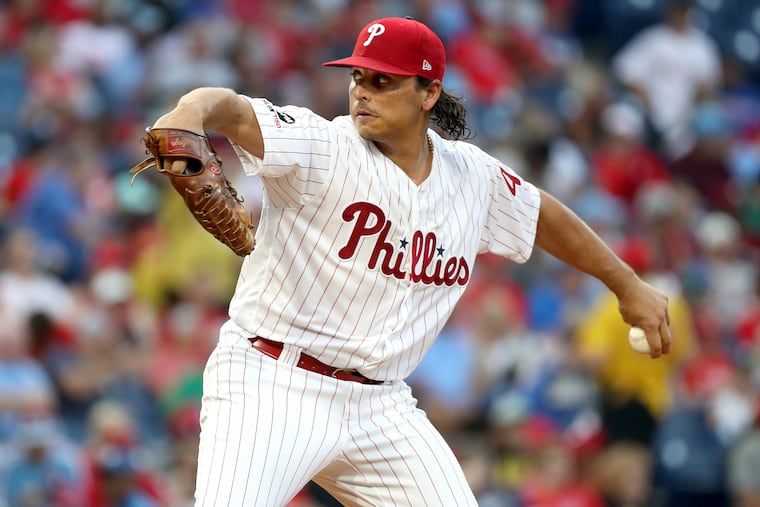Jason Vargas is hoping to make an impact on the other side of the Phillies-Mets rivalry
The soft-tossing lefty is making a smooth adjustment to the other side of the Phillies-Mets rivalry.

PHOENIX -- Until he walked into the Phillies' clubhouse after last Thursday's game at Citizens Bank Park, most of Jason Vargas' contact with his new teammates came as a member of a division rival with whom they have had an on-again, off-again beanball feud this season.
Awkward, right?
"Not really," Vargas said Tuesday before the Phillies continued their three-game series against the Arizona Diamondbacks here at Chase Field. "I'm sure my feelings were a lot stronger towards the guys that were on my team at that moment. But I don't think there was anything personal enough on either side of the fence to trigger something that would make it uncomfortable for me in here now."
It nevertheless has been a whirlwind week for the Phillies' newest starting pitcher.
Vargas was acquired from the New York Mets on July 29 for a double-A catcher and cash. He wasn’t added to the roster until three days later, the eve of his first start for the Phillies. He worked out on his own for a few days, then threw a bullpen session after a day game last Thursday.
And although he pitched well in his debut last Friday night against the Chicago White Sox, he was a footnote in a 15-inning loss in which an outfielder (Roman Quinn) pitched the final two innings and a pitcher (Vince Velasquez) played left field, even throwing out a runner at home plate.
Things have calmed down considerably for Vargas since then. He has resumed his usual between-starts routine and gotten to know his teammates better. And he will make his second start for the Phillies on Wednesday night in the series finale against the Diamondbacks.
"I think it's been more of me just kind of blending in," Vargas said. "I think I probably have age on my side as far as making it a little bit easier transition. But no matter how long you've been playing or haven't, you just try to stay out of the way for the most part and do what you need to do to get your job done."
The Phillies traded for Vargas because they believe the 36-year-old left-hander will help stabilize a starting rotation that has struggled for most of the season. The Mets, quite clearly, weren't worried about it. They essentially replaced Vargas by trading for right-hander Marcus Stroman from the Toronto Blue Jays on July 28 and have won 12 of their last 13 games to climb back into the National League wild-card race. Entering play Tuesday night, they were just two games behind the Phillies.
With six games remaining against the Mets (Aug. 30-Sept. 1 at Citizens Bank Park, Sept. 6-8 at Citi Field), Vargas likely will face his former team at least once.
"I'm guessing that I'll probably draw one of those games, and I'll pitch as if they were any other team," Vargas said. "I've pitched against teams that I've been on before and have a lot of friends and relationships with the guys. It's never changed the way that I feel about not wanting to get embarrassed on the field."
There's no denying that Vargas gives the Phillies' rotation a different look. For one thing, he's left-handed. The Phillies haven't had a full-time lefty in the rotation since Adam Morgan at the end of the 2016 season. With Vargas and recently acquired Drew Smyly, they now have two.
But Vargas also is unlike any pitcher in the majors because of his style. The average velocity on his fastball is 84.5 mph, according to Statcast. Not only is it the slowest-moving heater in the majors, it's also only 5 mph faster than Quinn's.
It surely wouldn’t have bothered Phillies batters as much if they’d gotten hit by Vargas’ fastball. Regardless, Vargas believes it gives him an edge and has possibly even lengthened his career.
“There’s no doubt about it,” Vargas said. “There’s no way around it. Almost everybody that pitches has velocity nowadays. It’s just the norm of how the game has progressed. Fortunate enough for me, my style of pitching still plays. I don’t know if it’ll ever go back to that or there will be a more even mix at some point in the future. Baseball tends to evolve over the years, but my style still plays.”
The Phillies are counting on it playing in their favor.